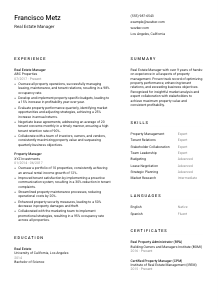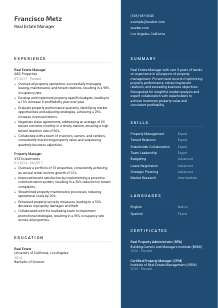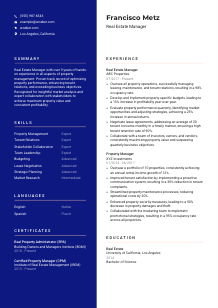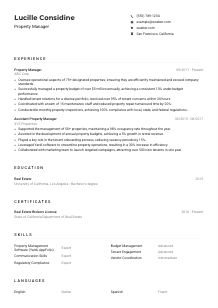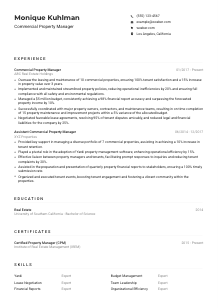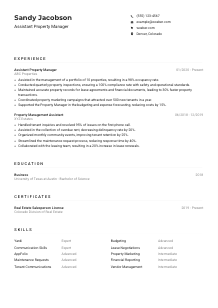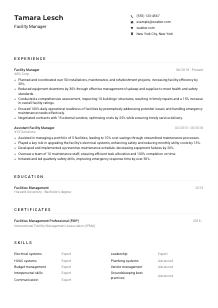Real Estate Manager Resume Example
Maximizing property portfolios, but your resume feels vacant? Browse this Real Estate Manager resume example, developed with Wozber free resume builder. Grasp how seamlessly you can align your asset acumen with job expectations, ensuring your career foundation is as rock-solid as your investment game!
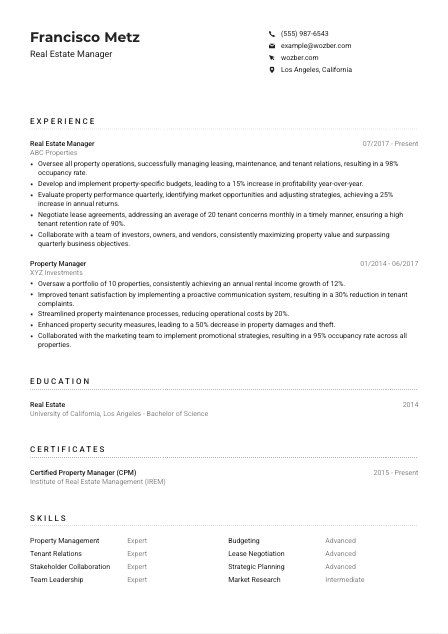
How to write a Real Estate Manager Resume?
Are you ready to unlock the door to your dream Real Estate Manager position? In an industry as competitive as real estate, your resume isn't just a document—it's your personal billboard, showcasing your unparalleled expertise and achievements. With Wozber, you're not just writing a resume; you're strategically crafting an ATS-compliant masterpiece designed to pass through the digital gatekeepers and catch the eye of your future employer. Let's embark on this journey together and sculpt a resume that not only meets the job description but also highlights your unique value in the real estate world.
Personal Details
Your Personal Details section is your opening handshake in the virtual world. Let's ensure it sets the right tone and aligns perfectly with your desired Real Estate Manager role.
1. Your Name as Your Brand
Your name is the first thing the hiring manager sees. Ensure it's prominently displayed with a clear, readable font, potentially larger than the rest of your resume to make it stand out. Think of it as the logo representing the brand of You.
2. Job Title Alignment
Right below your name, crisply state your professional title. Aligning it with the job you're applying for, such as "Real Estate Manager", immediately tells the hiring manager you're a fit for the role. This step tailors your resume directly to the job and serves as a quick sign that you understand the industry.
3. Essential Contact Information
Your contact details are your invitation for further conversation. List your most reliable contact number and a professional email address (formatted as firstname.lastname@email.com). Accuracy and professionalism here signal you're attentive to details, a crucial trait for any successful Real Estate Manager.
4. Location Matters
Real estate is all about location, including your own. Specify "Los Angeles, California" if that's your base, aligning with the job's requirements. It subtly assures the employer of your immediate availability and familiarity with the locale, an essential aspect of property management.
5. Showcase Professional Platforms
If you maintain a LinkedIn profile or a professional website, include these links. Ensure they are up-to-date and mirror your resume contents. For a Real Estate Manager, showing your connectedness and reputation in the industry can be a significant advantage.
Takeaway
Your Personal Details section is the gateway to your professional world. It's succinct but impactful, setting a professional tone while ensuring every word aligns with the Real Estate Manager role you desire. It's more than information; it's your first impression.





Experience
Real estate is a results-oriented field, and your experience section is where you showcase your capability to deliver. Let's craft this section to reflect unparalleled success, dedication, and mastery in real estate management.
- Oversee all property operations, successfully managing leasing, maintenance, and tenant relations, resulting in a 98% occupancy rate.
- Develop and implement property‑specific budgets, leading to a 15% increase in profitability year‑over‑year.
- Evaluate property performance quarterly, identifying market opportunities and adjusting strategies, achieving a 25% increase in annual returns.
- Negotiate lease agreements, addressing an average of 20 tenant concerns monthly in a timely manner, ensuring a high tenant retention rate of 90%.
- Collaborate with a team of investors, owners, and vendors, consistently maximizing property value and surpassing quarterly business objectives.
- Oversaw a portfolio of 10 properties, consistently achieving an annual rental income growth of 12%.
- Improved tenant satisfaction by implementing a proactive communication system, resulting in a 30% reduction in tenant complaints.
- Streamlined property maintenance processes, reducing operational costs by 20%.
- Enhanced property security measures, leading to a 50% decrease in property damages and theft.
- Collaborated with the marketing team to implement promotional strategies, resulting in a 95% occupancy rate across all properties.
1. Dissecting the Job Description
Begin with a detailed breakdown of the job description, highlighting key responsibilities and achievements relevant to the role. This will help you tailor your experience precisely, demonstrating your direct alignment with the role's requirements.
2. Role and Context
Chronologically list your positions, starting with your most recent job. For each, include your title, company, and dates of employment. This structure offers a clear timeline of your career progression, essential for demonstrating stability and growth in the fast-paced real estate sector.
3. Targeted Achievements
Describe your accomplishments in previous roles with a focus on outcomes that mirror the job description. For instance, if the job emphasizes tenant relations and property profitability, highlight your success in these areas with quantifiable results.
4. Quantification is Key
Whenever possible, quantify your achievements. Whether it's a % increase in occupancy rate or a significant uptick in annual returns, tangible metrics add weight to your success stories, making your contributions palpable and memorable.
5. Relevance Rules
In real estate, focus is everything. Prioritize experiences directly related to property management and the Real Estate Manager role. This tells the hiring manager you have a laser focus and deep expertise in the field.
Takeaway
Your experience section is a narrative of your professional journey. It should read like a success story in real estate, highlighting your contributions, leadership, and positive impact on properties and teams you've managed. It's not just what you've done; it's how you've excelled—and that's what will capture the attention of your future employer.
Education
In real estate management, your educational background lays the foundation of your expertise. Let's ensure this section affirms your qualifications and sets you apart as a candidate with the right knowledge.
1. Identifying Key Requirements
First, pinpoint the exact educational qualifications the job description asks for. In this case, a "Bachelor's degree in Real Estate, Business Administration, or a related field" is the requirement. Matching this shows you have the necessary academic background.
2. Clear and Concise
Organize this section for clarity. List your degree, the field of study, and the educational institution, followed by your graduation year. This straightforward format makes it easy for the hiring manager to verify your credentials quickly.
3. Tailoring to the Role
Ensure your degree and field directly meet (or exceed) the job specifications. For instance, a Bachelor of Science in Real Estate showcases not just your academic achievement, but your dedication to this specific career path.
4. Relevant Courses and Achievements
If applicable, highlight coursework or projects that directly relate to property management, especially those that have given you a tangible skill set applicable in a real estate scenario. This is particularly useful if you're at the outset of your career.
5. Additional Accolades
Don't hesitate to mention honors, relevant extracurricular activities, or associations that can bolster your real estate credentials. This adds layers to your academic profile, showing engagement and initiative in your field beyond the classroom.
Takeaway
Your education section is more than a checklist. It's a showcase of your commitment to your craft, the depth of your knowledge, and your preparedness for the challenges of a Real Estate Manager role. Highlight your educational journey with an eye towards relevance and depth, affirming your readiness for the position.
Certificates
Certificates are like badges of honor in the real estate world—they highlight your specialized knowledge and ongoing commitment to professional development. Let's curate this section to display certifications that resonate with the job description and elevate your candidacy.
1. Matching with Job Requirements
Review the job posting attentively to identify required or preferred certifications, such as "Certified Property Manager (CPM)" or "Real Property Administrator (RPA)". Listing these certifications prominently signals that you meet essential qualifications.
2. Choose Wisely
Prioritize certificates that are directly relevant to the role of a Real Estate Manager, opting to showcase quality over quantity. This allows you to present a focused picture of your competencies and readiness for the specific demands of the job.
3. Dates and Details Matter
When listing certifications, include the issuing institution and the date of attainment (or expiration if applicable). This provides a clear timeline of your professional development and assures employers of the currency of your qualifications.
4. Stay Proactive
Real estate trends and regulations change. Maintain an active pursuit of professional development to keep your certifications up to date. This dedication reflects your commitment to staying at the forefront of the industry, a valuable trait for any Real Estate Manager.
Takeaway
Certifications in your resume speak volumes about your dedication to excellence and continuous growth in the real estate field. By strategically selecting and presenting these qualifications, you underline your expertise and proactive approach to your career. It's a testament to your readiness to excel in the dynamic world of real estate management.
Skills
Your skills section is a compact showcase of your professional toolkit, tailored to the Real Estate Manager position. It's where you align your abilities with the specific needs of the job, demonstrating you're not just capable but exceptionally fitted for the role.
1. Extracting from the Job Description
Carefully analyze the job posting to understand both the explicit and implied skills required. Skills like "Property Management" and "Tenant Relations" directly reflect the job's demands and set the framework for your listing.
2. Align Your Abilities
Select skills that match the job description and your own expertise. If "Stakeholder Collaboration" is highlighted in the job description, ensure it finds a place in your list, backed by real examples from your experience section.
3. Clarity and Impact
Focus on skills that you can confidently demonstrate and that will make a tangible impact in your role as a Real Estate Manager. Avoid overstuffing this section with every skill you possess. Instead, curate a selection that speaks to the heart of what makes you an outstanding candidate.
Takeaway
Your skills section is your professional highlight reel—short, impactful, and profoundly influential. By aligning your listed skills with the job's requirements, you're not just telling your future employer you're a good fit; you're showing them you're the perfect candidate for the role. Let these skills be the key that unlocks the door to your next opportunity in real estate management.
Languages
In today's global property market, the ability to communicate across languages is a valuable skill for a Real Estate Manager. From dealing with international investors to engaging with diverse tenants, your linguistic abilities can set you apart.
1. Job Description Check
Review the job requirements for any specified language needs. In our example, "English speaking and comprehension skills required" is a clear stipulation, marking English proficiency as a must-have on your resume.
2. Prioritize Key Languages
List the languages required for the job at the top, specifying your level of proficiency. For a Real Estate Manager in Los Angeles, mentioning any additional languages, especially Spanish, can be a significant asset given the city's multicultural landscape.
3. Additional Languages
Even if not explicitly required, other language skills can embellish your resume, showcasing your ability to communicate with a broader range of clients and stakeholders.
4. Honesty in Proficiency
Be truthful about your language skills, using terms like "Native", "Fluent", "Intermediate", and "Basic" to describe your proficiency. This honesty helps set realistic expectations and demonstrates integrity.
5. Considering the Global Scope
For positions with an international dimension or in diverse communities, your ability to communicate in multiple languages can be a compelling advantage. It reflects your readiness to engage with a wide array of clients and situations.
Takeaway
Your language skills are more than just a line on your resume; they are a testament to your capacity to navigate the global and diverse nature of real estate. By accurately representing your linguistic abilities, you position yourself as a versatile and adaptable candidate, ready to excel in a multicultural market. Let your language skills open new doors and build bridges to your success in real estate management.
Summary
Your summary is the lead-in to your professional story, offering a snapshot of who you are, what you've achieved, and why you're the ideal candidate for the Real Estate Manager role. It's your moment to shine, so let's make it count.
1. Capturing the Job's Essence
Start by absorbing the core requirements and objectives of the role. Understanding the deeper needs behind the "Real Estate Manager" title enables you to position yourself as the solution.
2. Opening Statement
Initiate with a powerful introduction that encapsulates your professional identity and aligns it with the job you're aspiring for. Think of this as your personal tagline in the context of real estate management.
3. Highlighting Key Achievements
Showcase a selection of your most relevant skills and pivotal accomplishments. Let these highlights paint a picture of your success in real estate, positioning you as a standout candidate for the manager role.
4. Brevity with Punch
Keep your summary concise yet impactful. Aim for 3-5 lines that grab attention and invite the hiring manager to dive deeper into your resume. Think of it as your trailer—it should lure the audience into wanting the full story.
Takeaway
A compelling summary is your elevator pitch, encapsulating your professional essence and firmly aligning it with the Real Estate Manager role. It sets the stage for your resume, pre-selling your worth and enticing the hiring manager to engage with your full professional narrative. Let it reflect your enthusiasm, expertise, and the unique value you bring to the property management arena.
Unlocking Your Career Goals
You're now equipped with the insights and strategies to craft an ATS-compliant resume that speaks directly to your aspirations as a Real Estate Manager. With every section finely tuned and every word chosen for impact, your resume is not just a document—it's your professional manifesto. Remember, Wozber is here to assist with free resume builder tools, including ATS-friendly resume templates and an ATS resume scanner. It's time to leverage these tools, refine your resume, and step into your next big role in real estate management with confidence.
The market is open, and your next opportunity is waiting. Go forth and conquer!

- Bachelor's degree in Real Estate, Business Administration, or a related field.
- Minimum of 5 years of experience in property management or real estate, with at least 2 years in a managerial position.
- Strong working knowledge of local, state, and federal real estate laws and regulations.
- Excellent leadership and communication skills, with the ability to manage cross-functional teams and client interactions effectively.
- Valid real estate license or relevant certifications, such as the Certified Property Manager (CPM) designation or Real Property Administrator (RPA) certification.
- English speaking and comprehension skills required.
- Must be located in Los Angeles, California.
- Oversee property operations, including leasing, maintenance, and tenant relations, to ensure optimal performance and profitability.
- Develop and implement property-specific budgets, goals, and business plans.
- Evaluate property performance regularly, conducting market research and adjusting strategies as needed.
- Negotiate lease agreements and liaise with tenants, addressing concerns or issues in a timely manner.
- Collaborate with stakeholders, such as investors, owners, and third-party vendors, to maximize property value and achieve overall business objectives.





